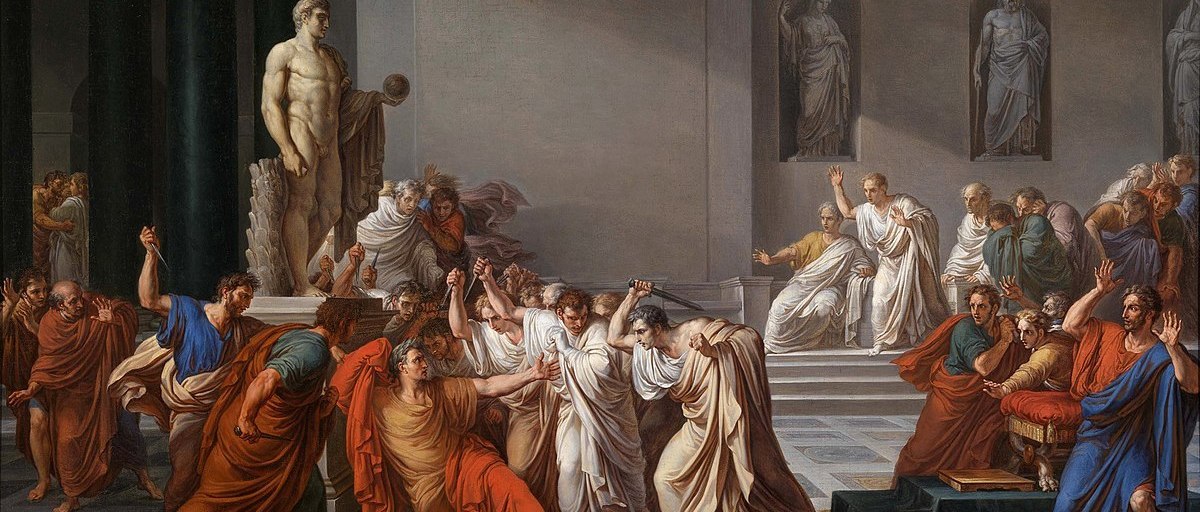Julius Caesar: The Ides of March
Posted on 6th July 2021
Gaius Julius Caesar was born on 12 July, 100 BC, in the Subura district of Rome to one of its most noble families; one indeed that proudly claimed direct descent from the Goddess Venus. His father, also Gaius, had once been the Governor of a Roman province but their exalted status belied a lack of money and their political influence diminished as a result. He was to spend the rest of his life trying to restore the family’s honour and prestige.
Caesar's childhood was typical for someone of his class his academic training was rigorous and coupled with the masculine arts. When he wasn’t reading Homer or Virgil he learned to ride, to wrestle, and how to wield a sword. He took great pride in his physicality believing there was no one he could not better in single combat or anyone that had greater energy or stamina than he did.
When he was still only 16 his father died, and he became the head of the family. Always an earnest child he took his new responsibilities seriously and it was well that he did for he was about to face the first great crisis of his life.
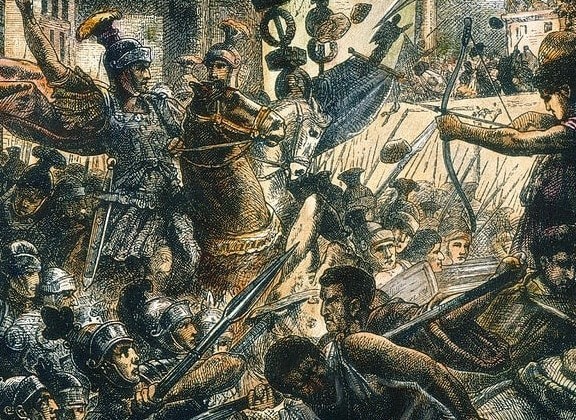
By 82 BC, Lucius Cornelius Sulla was ruling Rome. He was a man of unlimited ambition but one for whom power was an end in it itself. He was nonetheless ruthless in acquiring it and when the opportunity presented itself, he marched his army on Rome defeating the allies of his long-time adversary Marius at the Battle of the Coline Gate.
Sulla now acted swiftly to secure his position purging those in the Senate who opposed him and posting a series of proscribed lists throughout the city, these were the names of people he had declared public enemies and as such it was the responsibility of every citizen to kill or do them harm. If they did so, then their property would become forfeit and the killer could legitimately lay claim to it.
The historian Plutarch described how: “Sulla began to make the blood flow, and filled the city with deaths without number or limit.”
To murmurings of discontent even among his erstwhile supporters he responded threateningly that he had killed all those he could remember, those he had temporarily forgotten he would proscribe in the future. As many as 1500 Senators and Noblemen along with 9,000 others of lesser rank had already been killed.
One of those on the proscribed list was the young Julius Caesar, who as the adopted nephew of Sulla's great rival Marius was considered a threat. Caesar's mother, Aurelia Cotta, concerned for her son's safety begged the Chief Vestal to intercede with Sulla on his behalf.
Sulla firmly believed Caesar was a member of the Marian Faction in Rome and a young man with ambitions to rival his own, but Aurelia Cotta was an old friend and the Vestal Virgins were held in great esteem. He reluctantly removed Caesar’s name from the proscribed list but even as he did so remarked somewhat threateningly, "I see a great deal of Marius in him." He would later go onto say about Caesar, who even as a young man was famous for wearing his clothes in a rather loose and louche style: "Beware of the boy who wears loose clothes, for one day he will be the ruin of the Republic.”
Caesar, who had earlier gone into hiding, was permitted to return to Rome.
A year after seizing power, Sulla who was uninterested in and bored by the minutiae of administration voluntarily abandoned the role of Dictator that had been ascribed him by a decimated and intimidated Senate, and the following year resigned the Consulship.
He had always been a man who lived life to the full and he was as relentless in his pursuit of pleasure as he had been in war and politics. His love of a party and a drag queen were notorious, and he now retired to his villa in Puteoli to indulge both with abandon.
Despite having relinquished power, Caesar could not feel entirely secure until Sulla died. In 78 BC, he did just that and Caesar was again able to openly pursue his political ambitions.
He had been serving with the army in the Eastern Provinces far away from Sulla’s prying eye and upon his return to Rome he had little in the way of possessions other than the family name. He was as heavily in debt as were they now dispossessed of their property, estates and reduced to living in the poorer part of town. He turned to law to make ends meet.
He was no Cicero but still it gave him a start and he remained determined to re-establish the Julian Clan to a status befitting a family related to the God Jupiter himself but to do this he had to enter the political arena. In 77 BC, he set off for Greece to learn the art of oratory, a vital tool for anyone with political ambitions.
On their way across the Aegean Sea his ship was intercepted by Illyrian Pirates, and he was taken hostage. Caesar was not a man easily intimidated and he adopted an attitude of superiority throughout his captivity. When they demanded twenty talents for his release, he feigned disgust and insisted they ask for at least fifty.
He would read them his poetry and if they did not express their appreciation, he would berate them for their ignorance. He would also challenge them to armed combat and wrestling bouts invariably triumphing at both. When the ransom for his release was paid, he laughingly told them he would back to see them hanged. But he was not joking.
A little later, having raised a small fleet he returned and captured his former tormentors. He was to prove as good as his word and ordered them all crucified. Because he secretly quite admired them in an act of mercy before they were nailed to the cross, he ordered their throats cut.
His political career was hardly meteoric however, and it wasn’t until 69 BC that he was elected to the post of Quaestor, an official who supervised the financial affairs of the State and was sent to serve in Spain.
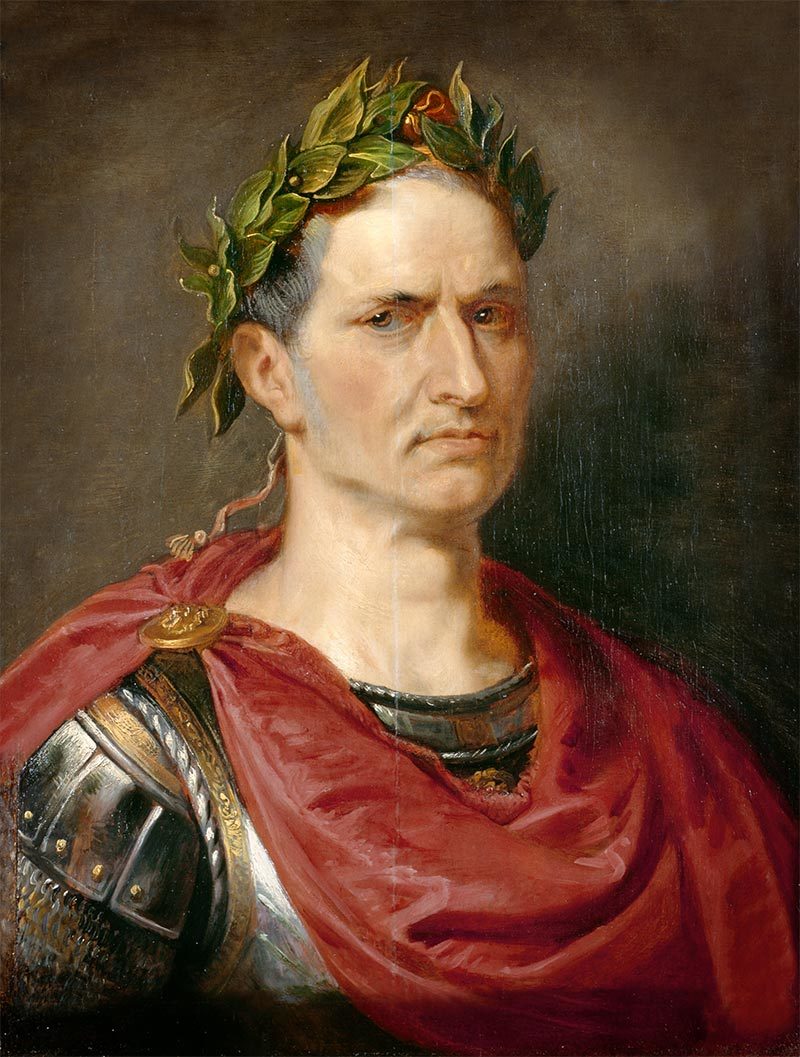
Whilst there, confronted by a statue of Alexander the Great, he broke down and wept. He was already 31 years old by which age Alexander had conquered most of the known world, while he, Caesar, was still dealing with petitions and accounts.
His position as Quaestor may have been only the first rung on the political ladder but it brought with it lifetime entry into the Senate. It was an important first step, but it was also a time of great personal tragedy, for that same year his wife Cornelia died. Her passing upset him greatly but the grief he kept to himself. Public displays of emotion were, he believed, a sign of weakness.
Returning to Rome, Caesar's political ambitions remained undimmed but his path to power was to be a long and hard one. He was not popular with Roman elite who disliked his swagger and resented his constantly reminding them of his divine descent. For a man of such meagre means he appeared to have a very high opinion of himself.
He was also extremely vain. The historian Plutarch describes him as being: "So very particular of his personal appearance, being clean shaven, sensitive of his premature balding and though subject to epilepsy his physical endurance was formidable.”
Whilst Suetonius writes: "With dark lively eyes, tall, and well-built, he not only had his hair carefully trimmed but also had his body hair removed with tweezers."
In 67 BC, he married Pompeia, a granddaughter of Sulla.
It was a political marriage and not a particularly happy one, but it brought Caesar valuable connections and a small fortune which he nonetheless quickly squandered. They were to divorce some years later.
Despite having little money, Caesar would entertain lavishly and though he was amiable and charming by night he was less so by day. As such, his charm offensive gained little traction and made him few friends so unable to win over the Senate he looked elsewhere for the support he required.
If the great and the good could not be bought, then he would court the common people even if to do so was considered crass and unseemly. So, unlike most of the high-born in Rome he visited the slums, he entered their homes, he shook their hands, and he kissed their babies. He did not fear their vulgar ways and was not deterred by outbreaks of the plague, neither did he shy away from buying their support.
In 63 BC, he ran for the post of Pontifex Maximus or High Priest. He staked everything on this and told his mother on the eve of the election that by nightfall he would be a priest or a pauper.
Caesar won but in securing victory it had cost him everything he had. He was now a man without material wealth, without substance and who was quite literally living on a prayer.
Many dismissed him as someone who was buying short-term fame at great personal expense.
Despite a paucity of funds and few backers he remained determined to become Consul, the most powerful political figure in the Roman Republic. In 60 BC, he made his bid in what was a bruising election during which he left nothing to chance.
He knew that the Roman political elite, fearing his ambition, would pull out all the stops to prevent him from being elected and even the apparently incorruptible Cato, the most admired man in Rome resorted to bribery to try and stop him. So, he brought votes at very great expense and had gangs of armed thugs roam the streets intimidating his opponents. He then had their house surrounded so they could not leave and threatened to harm their children if they dared cast their ballot against him. His tactics worked and he won a close contest but as two Consuls were elected each year, he was expected to share power with his conservative rival, Marcus Calpurnius Bibulus. But Caesar had no intention of sharing power with anyone.
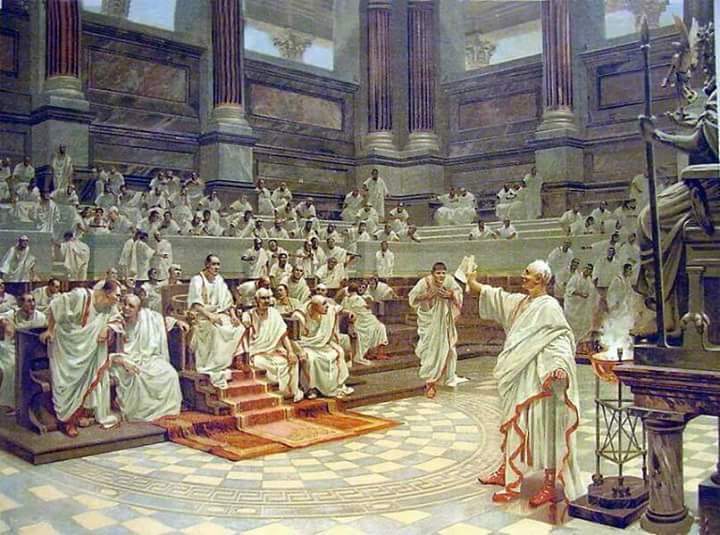
A Consul was invested with executive power and effectively headed the Government of the Roman Republic. They served as Chief Magistrate, presided over the Senate, convened meetings, guided through legislation and were Commander-in-Chief in time of war.
Two Consuls were elected each year at the same time and were expected to alternate their power each month with each Consul having the power of veto over the other.
Caesar had been busy forging an alliance with the two most powerful men in Rome: Marcus Licinius Crassus the wealthiest man in the city who had already bailed him out financially and Pompey Magnus Rome's most formidable General. With Caesar bringing his support among the common people to the table they formed a formidable bloc and were to effectively rule Rome as a Triumvirate.
To cement his relationship with Pompey he gave him his daughter Julia's hand in marriage.
Caesar was to flagrantly abuse his power as Consul and instead of convening meetings to discuss legislation and guide it through the Senate he now proposed his own. In this he had little choice for he had to repay the people for their support if he wished to guarantee it in the future. As a result, he now proposed a law for the redistribution of land. When the Senate protested Pompey sent his troops onto the streets to intimidate them.
Bibulous, who had said that he would veto the proposal was attacked on the floor of the Forum, his bodyguards were beaten, those Magistrates who attended to him were likewise roughed-up, and he had a bucket of shit emptied onto his head. The terrified Bibulous fled the Senate House and returned home, not leaving it again until his tenure as Consul had ended.
When Caesar's term as Consul finished, the Senate, encouraged by Cato, tried to humiliate him by having him appointed Governor of the Italian Forests and Cattle Paths but his political connections ensured that he instead received the Governorship of Transalpine Gaul in southern France.
IIn 58 BC, it was reported that a Germanic Tribe, the Helvetii, were migrating south and were believed to number as many as 300,000. Caesar constructed a 16-mile barrier in their path to prevent them from entering Italy before he confronted them in battle.
In what was a fierce struggle the Helvetii were defeated but with the memory of Spartacus's slave rebellion still fresh in the memory, Caesar chose not to take prisoners and those Helvetii who fell into Roman hands were slaughtered. It was also the case that to procure a Triumph through the streets of Rome a threshold of 5,000 enemy killed needed to be met something Caesar was well aware of.
The perceived threat of invasion by the Helvetii had been a gift for Caesar and he used it to justify waging war elsewhere and enriching himself in the process.
Not legally permitted to take his legions beyond the borders of Roman territory by invading northern Gaul Caesar had acted illegally. If the prospect of being recalled and censured concerned him he chose to ignore it as advancing through Gaul, he defeated the tribes seized their property and sold them as slaves. Much of this booty he sent back to Rome to be distributed among the people. His generosity may have increased his popularity with the people but it stoked fear and anxiety within the Senate and the nobility.
In 55 BC, Caesar took two legions, around 10,000 men, across the Channel to Britain but here at least his invasion was not a success. Hampered by bad weather and meeting stiff resistance he advanced little beyond his beachhead and soon after returned to Gaul.
He was to invade a second time the following year with a greater force and remain a little longer but with no more success and he soon abandoned Britain altogether as not worth the effort. That was not how he portrayed it, however. He was always eager to write of his military exploits and send them back to Rome where as far as most people were concerned his invasion of Britain had been a great success.
By 52 BC, Caesar's behaviour in Gaul had seen the Gallic Tribes unite to oppose him under the command of Vercingetorix. He was to prove an astute and resourceful military leader perhaps the most formidable Caesar ever faced. While he was away raising reinforcements, Vercingetorix set about slaughtering those Romans who had already settled in Gaul. He then adopted a scorched earth policy burning those villages and farms in Caesar’s path destroying their livestock and crops to prevent the Roman Army from living off the land.
He also used guerrilla tactics to thwart Caesar in a series of minor engagements before inflicting a major defeat upon him at the Battle of Gergovia. But his victory had been bought at such a cost that he was forced to withdraw to the Hill Fort of Alesia.
Caesar was quick to take advantage of Vercingetorix's temporary discomfiture and had his army surround the fort. He then had them build two lines of fortifications, one to keep Vercingetorix from breaking out the other to prevent any reinforcements from breaking in.
The situation in Alesia would soon become desperate and Vercingetorix with so little food was forced to expel the women and children from the fort. Caesar would neither help them nor permit them to escape and they were left to starve to death outside the town’s walls.
When reinforcements from the other Gallic tribes finally arrived, it was not in sufficient numbers to break the siege but when Vercingtorix also sallied forth the combined attack very nearly broke through and Caesar barely rallied his troops in time. They had stood their ground, but it had been a close run thing.
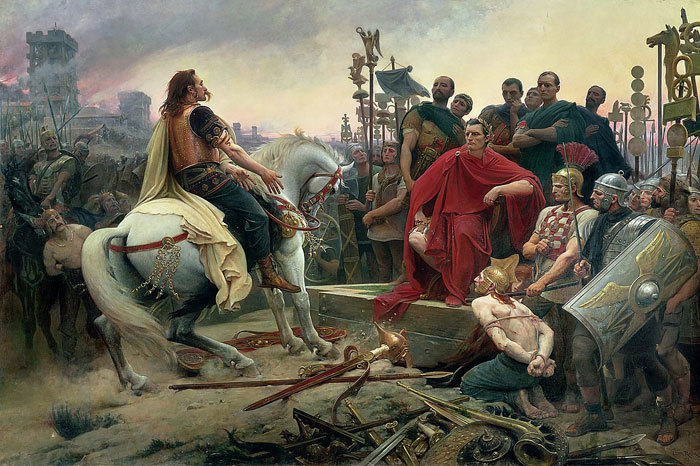
With little prospect of victory, the Gallic tribes withdrew and Vercingetorix was forced to surrender and prostrate himself before Caesar. He was to be held prisoner in appalling conditions for five years before being paraded through the streets of Rome and publicly garrotted.
The Battle of Alesia was Caesar's greatest triumph and the finest example of his ability as a field commander and tactician of genius. With it he had subdued all resistance and conquered the entirety of Gaul for the Roman Empire.
Six years of almost constant warfare had at last made Caesar a rich man. It had also made him a hero of the Roman people.
However, in 53 BC, his great benefactor Marcus Licinius Crassus, who had bankrolled so many of his political campaigns was captured and executed by the Parthians. Earlier, his daughter Julia who was married to Pompey had died in childbirth. Pompey who had come to adore his teenage bride was devastated but when Caesar then offered his great-niece as a prospective wife, Pompey refused her hand in marriage. It was a snub that was to mark the beginning of the decline in their relationship.
Caesar's most implacable enemy in Rome was Marcus Porcius Cato, who had long suspected him of seeking absolute power. He believed Caesar to have been one of the conspirators in the Caitline Conspiracy of 63 BC, that had sought to usurp the Senate and overthrow the Republic, but Cicero who was Consul that year had refused to have him indicted.
The supposedly incorruptible Cato who rejected Senatorial robes for rough woollen cloth, walked everywhere barefoot, and was the leading advocate of moral propriety in all things now whispered poison into Pompey's ear.
Caesar, he said, was a dangerous usurper who wanted to seize control of the Republic and make himself King. He would lead his armies against Pompey, and he would replace him as the leading man in Rome.
In 50 BC, Caesar's tenure as Governor of Transalpine and Cisalpine Gaul came to an end. Pompey now insisted that he disband his armies and return to Rome, but there were those in Rome, Cato foremost amongst them, who were determined to prosecute him for theft and waging illegal war.
Caesar knew that as his Governorship of Gaul had expired, he was no longer immune from prosecution and that to return to Rome would leave him at the mercy of his enemies. So instead, he requested that he be awarded another Governorship. Pompey was at first willing to negotiate a settlement, but Cato would not hear of it. He controlled the Senate and demanded that Caesar face trial as the criminal he undoubtedly believed he was. Caesar was given little choice but to act In January 49 BC, with just one legion he crossed the Rubicon River into Italy. He knew that to do this was in effect a declaration of war and remarked: "The die is cast."
Cato was outraged at Caesar's actions and his flagrant disregard for the law. But he did not fear him for he had Pompey Magnus on his side, Rome's greatest General. Pompey, however, was in a difficult position.
The Garrison in Rome was made up of Caesar's veterans and were thought unreliable so Pompey had to raise fresh troops, but these would be untrained and inexperienced. Though Caesar had only one legion he did have many more waiting to join him on the other side of the Alps, and so Pompey decided to abandon Rome taking most of the Senate with him.
Caesar pursued him relentlessly all the way to Brundisium on the East Coast of Italy, but Pompey managed to escape to Greece. Caesar would follow him there, but first he would defeat Pompey's remaining forces in Spain. Meanwhile in Rome, under the direction of Caesar’s ally Mark Antony what remained of the Senate appointed Caesar Dictator for the coming year. In Greece however the tables had turned. Pompey’s legions now greatly outnumbered those available to Caesar by as much as two-to-one, and at the Battle of Dyrrachium in Albania on 14 July 48 BC, Caesar barely avoided catastrophe. Forced into a hasty retreat Pompey pursued him until he was once more trapped.
Pompey wanted to keep Caesar bottled up and starve him into submission, but this was considered a dishonourable course of action. Most of those Senators present wanted to see Caesar defeated in battle and either killed or paraded before them in utter subjection.
Caesar, with no prospect of reinforcement or resupply (though Mark Antony had since joined him with one legion) had little choice but to prepare for battle but now he used his parlous position to his advantage. He addressed his troops, veterans of so many campaigns, and told them in no uncertain terms that for them it was victory or death. There could be no retreat and no surrender, but that he had utter faith in their abilities. The troops in turn had total confidence in their Commander who had led them to so many victories, so many conquests and so much glory.
The two armies met on the Plain of Pharsalus in central Greece on 9 August, 48 BC.
Caesar's army of 22,000 men was easily outnumbered by those at Pompey's disposal but they were fighting for their lives their enemy was not and after what seemed a promising start Pompey’s army crumbled and went down to abject defeat. The once Pompey the Great was forced to flee in disguise and alone except for his wife, children and a few loyal retainers.
As was his way, Caesar granted most of those captured amnesty not out of a sense of mercy but that in the humiliation of defeat and on pain of death he could guarantee their future loyalty.
Pompey meantime fled to Egypt where he hoped to gain the support of the children of his old friend Ptolemy VII. As he approached the shoreline he could see a gathering on the beach which he took to be the young Pharaoh and his entourage.A boat came out to ferry him ashore manned by Roman mercenaries which at least put him at his ease, though he thought it strange that they were not willing to engage in conversation. As they approached the beach, he could see that there was no Royal party there to greet him and he must have suddenly been filled with trepidation. As he struggled ashore, he was grabbed by the arms and put through with a sword. Stabbed repeatedly he slumped to his knees in the water where already in his death throes he was beheaded.
When some weeks later Caesar arrived in the Egyptian capital, Alexandria, he was presented with Pompey's pickled head in a jar by Ptolemy's Chief Advisor, the eunuch Pothinus. Rather than please Caesar as had been expected it enraged him and he wept at the sight of it.
Pompey after all, was not just a Consul of Rome but had also been the husband of his only daughter Julia and a long-time colleague and friend. To see him meet such a sordid end at the hands of people the Romans considered little better than barbarians was an outrage.
He was not shy in letting his displeasure be known and demanded the rest of Pompey's remains so that he could bury him with all due ceremony and that his killers be handed over to face Roman justice.
By his actions the young Pharaoh Ptolemy had made an instant enemy of Caesar and in the continuing dispute between himself and his sister Cleopatra he would side with the latter.
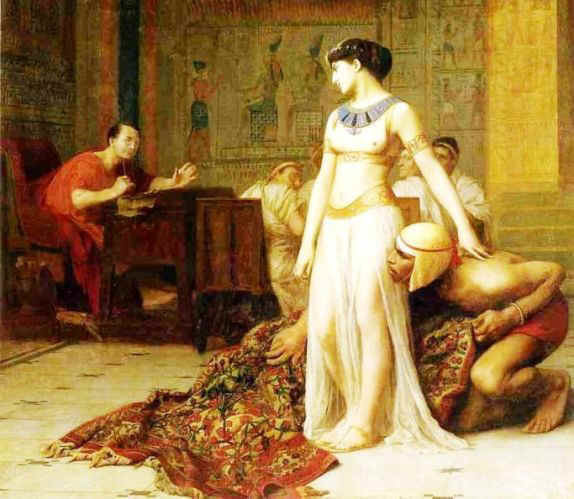
Upon hearing of the rift that had developed between her brother and Caesar, Cleopatra came out of hiding and had herself smuggled into the Imperial Palace. Plutarch describes what happened:
"Cleopatra, taking only Apollodorus the Sicilian from amongst her friends embarked in a little skiff and arrived at the Palace when it was already getting dark, and as it was impossible to escape notice otherwise, she stretched herself at full length inside a bed-sack, while Apollodorus tied up the bed-sack with cord and carried it indoors to Caesar, and it was by this device that Cleopatra first captivated Caesar, for she showed herself to be a bold coquette, and he succumbed further to her charms by having intercourse with her.”
Small with dark hair she wore short, dark eyes, pert breasts and a prominent nose which was considered at the time a sign of great nobility Cleopatra was not physically striking:
"Her beauty in itself was not incomparable nor was it such as to delight those who saw her. What made Cleopatra attractive was her wit, her charm, and the sweetness in the tone of her voice."
It might also be said that her beauty encompassed a waspish intelligence and the knowledge of how to seduce and pleasure a man. The 21-year-old Egyptian Queen and the 52 year old Julius Caesar became lovers that same night.
At Cleopatra’s request Caesar had the arrogant and overbearing Pothinus executed. Learning of this Ptolemy fled the Imperial Palace and joined his General Achillas's army. War between Egypt and Rome was now inevitable.
Caesar now declared Cleopatra Pharaoh and with just half a legion at his disposal, some 2,500 men, he now fortified the Imperial Palace to withstand a siege. Although the fighting was often fierce, he was to withstand all attempts by Achillas to break in and held out for almost six months until relieved by his allies Mithridaites of Pergamum and Antipater from Judea. During the siege however, the Great Library at Alexandria had been burned to the ground much to the disgust and dismay of Cleopatra.
In February, 47 BC, Caesar pursued the Egyptian Army and defeated it at the Battle of the Nile. Ptolemy, either in flight or on the orders of Caesar after capture drowned in the river.
Caesar uncharacteristically celebrated his victory by cruising down the River Nile in the arms of his nubile young lover but though he wasted valuable time delighting in the luxury of the Pharaohs he knew there were still enemies to be dealt with and scores to be settled.
Cato was still at large and with his Senatorial colleague Mettelus Scipio had raised an army in Africa. Caesar, his lust satisfied for the time being, travelled with his legions to Africa to confront his arch-enemy. The two armies met in Tunisia at the Battle of Thapsus on 6 April, 46 BC.
The forces were evenly matched but neither Cato nor Scipio shared Caesar's talents as a soldier and the decisive moment came when Caesar ordered his troops to make as much noise as possible to frighten the enemy war elephants. Terrified the beasts turned upon their own army, trampling them underfoot and scattering them across the plain. Seeing this Cato and Scipio's main African ally, the Numidian King Juba, believing the battle was already lost abandoned the field taking his army with him. Both Cato and Scipio escaped the rout but were to commit suicide soon after.
Whilst Caesar was dealing with his enemies in North Africa, Cleopatra had given birth to a son which she named Caesarion. Caesar was keen to express his delight at having a son and heir but whether he truly believed it his remains unknown.
Following his victory at Thapsus the Senate in Rome extended his tenure as Dictator to ten years, and the last remnants of any organised opposition to his rule was ended when he defeated Pompey's eldest son Gnaeus Pompeius, at the Battle of Munda on 17 March, 45 BC.
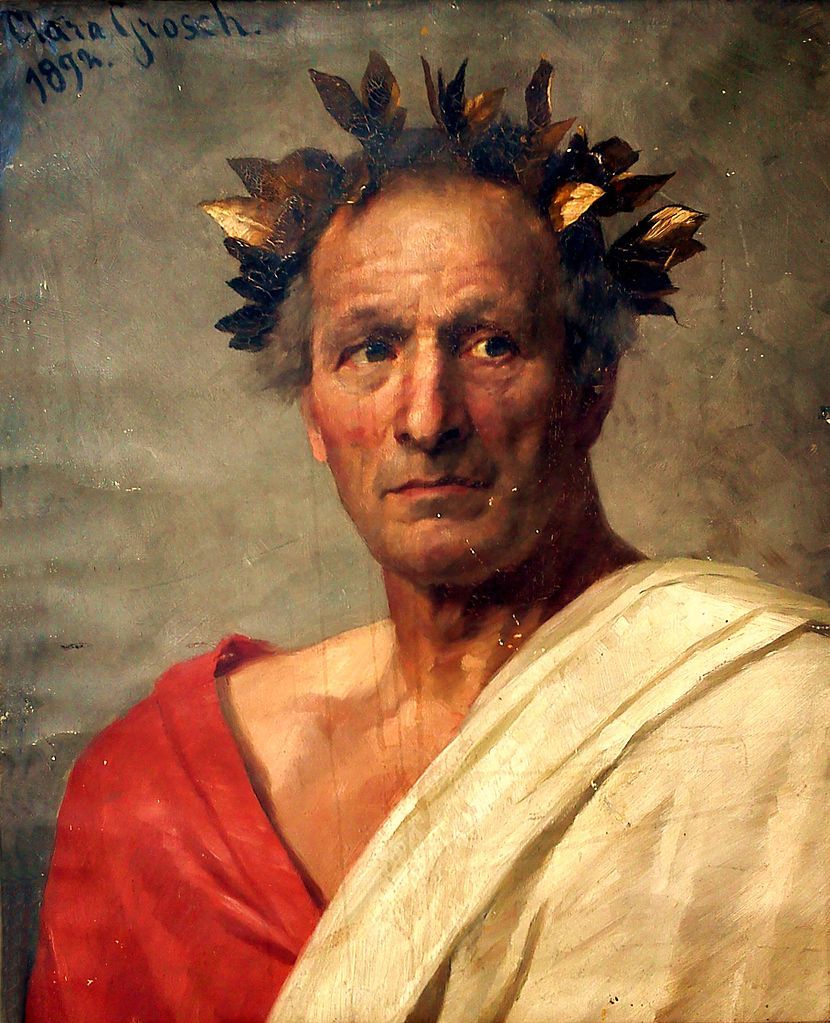
At 55 years of age, Caesar stood at the pinnacle of his career, and he returned to Rome in triumph. He had absolute power and was eager to get to work, but first he had to organise the Triumph that the Senate had awarded him for his victories over the Gauls and the Egyptians though not his fellow Romans.
The Triumph was to be on an unprecedented scale, and it was all about Caesar. So much so that it caused resentment and there were riots on the streets. It was one of the few occasions when Caesar misread the mood of the people.
Even so, there was much to be getting on with. He introduced a new constitution designed to cement his own power whilst major public works were undertaken many constructed in his honour. He also drew up plans to turn Ostia into a major port and commercial trading centre, land was parcelled out to his veterans, and professional guilds (effective trade unions) were outlawed.
Families were rewarded financially for having more children, State subsidised grain was strictly regulated to stamp out corruption and its selling on the black market, the tax system was reformed, and he also ordered the rebuilding of Carthage and Corinth that had previously been destroyed.
More significantly, he increased the number of Senators to 900 by appointing those who had supported him through the Civil War many of whom were Barbarians from Gaul and Hispania.
His most enduring change however was to the calendar which had previously been regulated by the movement of the moon but would now be regulated by the movement of the sun, as it was in Egypt. The calendar year was to be 365 days realigned every four years by a leap day in February. The month of Quintilus was renamed July in Caesar's honour.
Cleopatra had accompanied Caesar on his return to Rome and had paraded through its streets as if she was Queen of the City. This had caused such resentment that she thereafter was made to adopt a lower-profile and she remained quietly at Caesar's villa outside the city.
What Caesar's wife Cornelia thought of the situation remains un-recorded but can be imagined.
In 45 BC, Caesar drew up his Will naming his grandnephew Gaius Octavius, or Octavian, as his adopted son and successor, not Caesarion, his supposed son by Cleopatra. Next in line to Octavian, should he die before Caesar, was Marcus Junius Brutus. The Will he deposited for safekeeping in the College of the Vestal Virgins.
In February, 44 BC, the Senate appointed Caesar Dictator for life, and he had taken to wearing a toga of purple, made from the dye of crushed sea-snails. It was the most expensive and sought after colour, the colour of Kings and Emperors; and to his enemies, and he still had many within the political elite this appeared exactly what he was seeking to be.
They believed that he intended to destroy the Republic and establish an Imperial Dynasty.
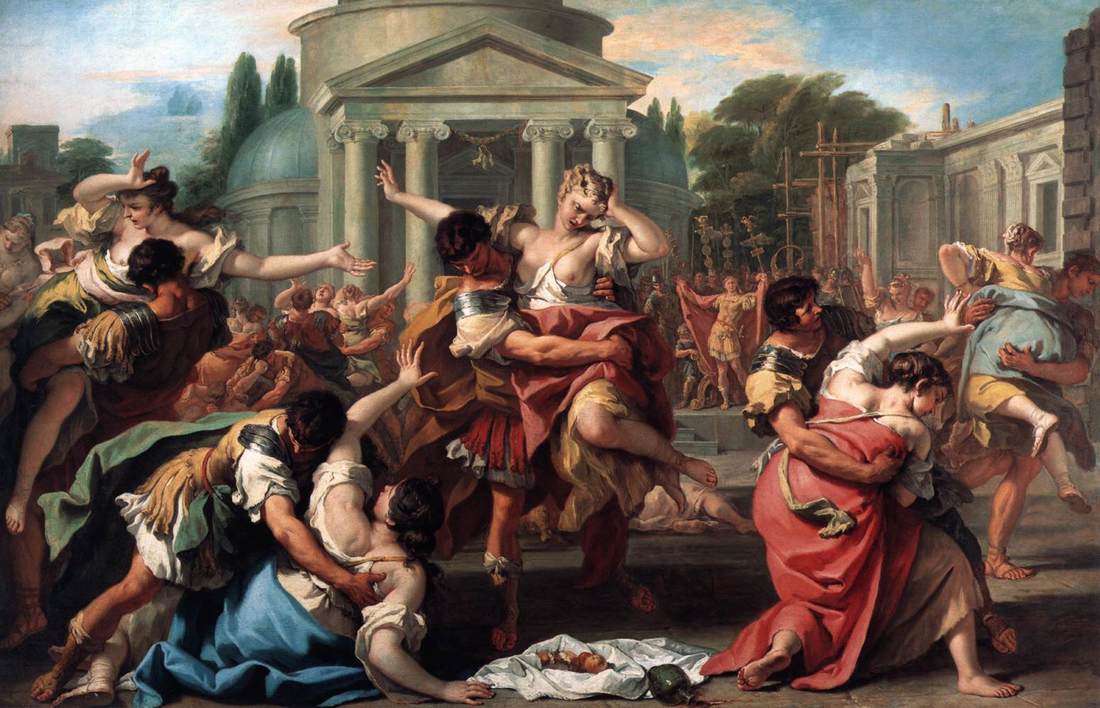
The Festival of Lupercalia held in honour of Lupa, the she-wolf that according to legend had suckled the infant Romulus and Remus, the founders of Rome, was a time of great celebration but not on this occasion for the crowd hushed and slowly began to boo and jeer as Mark Antony presented Caesar a laurel crown. Yet again he had misread the mood of the people and he hastily pushed Antony aside and declined to accept the gift.
It seemed that Caesar was losing his touch and it encouraged his enemies to act. For the sake of freedom and the ancient liberties of Rome he had to be removed but he would never freely relinquish power - he would have to be killed. The leading conspirators were Marcus Junius Brutus and Gaius Cassius Longinus
.
Brutus came from an old and distinguished family and his mother Servilla had been Caesar's long-time lover. Indeed, it was rumoured at the time that Brutus was his son. He certainly treated him as if he were his son and would frequently refer to him as such.
When Brutus joined Pompey and the Optimaites during the Civil War, Caesar was devastated by a betrayal he felt deeply. Following the Battle of Pharsalus, he ordered that Brutus was to be unharmed and taken prisoner even. if he resisted.
When Brutus wrote to Caesar apologising for his actions, he quickly forgave him and brought him into his inner-circle, even for a short-time appointing him Governor of Gaul.
Gaius Cassius Longinus was Brutus's brother-in-law and the moving spirit behind the conspiracy. He gathered together the plotters and planned the murder but ceded control to the higher-born Brutus. He would always refer to the conspirators as "Liberators" and was vocal in urging them to take action.
On 15 March, 44 BC, Caesar was due to attend a Senate meeting. He had been warned to be aware of the Ides of March and his wife Cornelia had also had forebodings and begged him not to go but he brushed her concerns aside. He had heard it all before and nothing had happened. So confident was he that he had even dismissed his bodyguard saying that: "It is better to die once than constantly fear death.”
The Senate House had earlier been so damaged by fire that the meeting had to be held in Rome’s only stone theatre. So, Caesar found himself in unfamiliar surroundings. He was accompanied by Mark Antony, but he was delayed before entering the theatre.
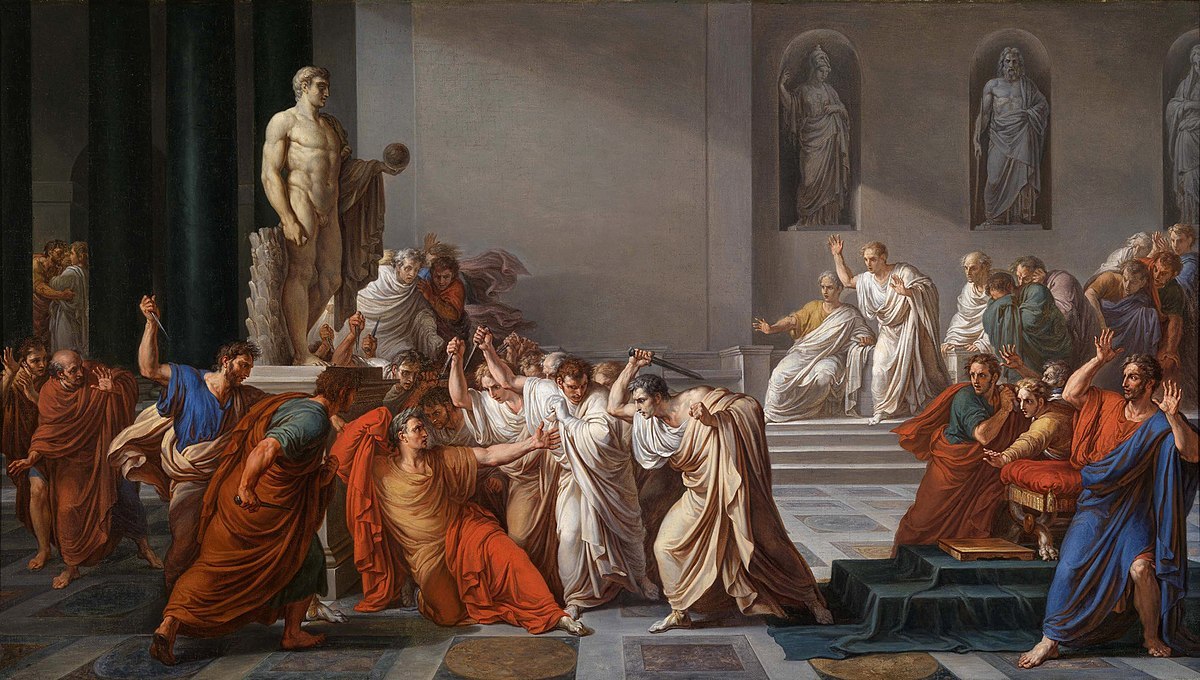
Once Caesar was safely inside, he was approached by the Senator Tillius Cimber who presented him with a petition for the return of his brother from exile. Caesar waived him away dismissively, but Cimber grabbed his arm. Caesar reproached him with the words, "Why, this is violence.”
As he tried to drag himself away, he was grabbed by others and within moments he was hemmed in by as many as 60 people. The Senator Casca thrust a dagger at his neck. Caesar cried, "Casca, you villain, what are you doing?" Soon daggers were being thrust at him from all directions and as he tried to break free, he stumbled and fell.
The conspirators were quickly upon him, and he pulled his tunic over his head so that no one should see him die. As Brutus plunged in his knife, a dying Caesar was heard to say, "You too, my son.”
Stabbed a total of twenty-three times, Caesar the Tyrant was dead.
Few had remained to witness the assassination and as the conspirators fled they did so from an empty auditorium.
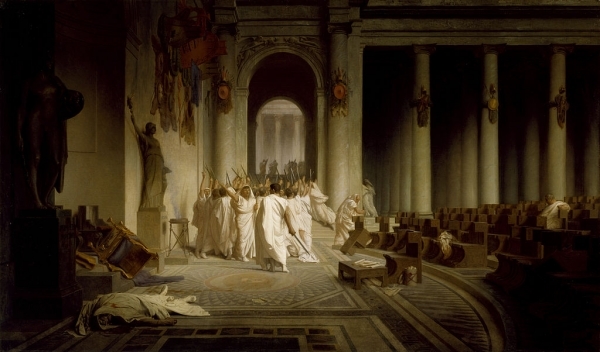
Following the murder of Caesar, the Senate immediately passed a motion granting his assassins amnesty but the fury of the Roman people, who had always loved the old rogue with their ire stoked by Mark Antony at his funeral ensured that Brutus, Cassius and the others were forced to flee not only Rome but Italy altogether.
The conflict that Caesar believed as Dictator he had ended would soon be renewed all over again and the Republic his murder had supposedly preserved cease to be replaced by the Empire of his nephew Octavian.
Tagged as: Ancient & Medieval
Share this post:





